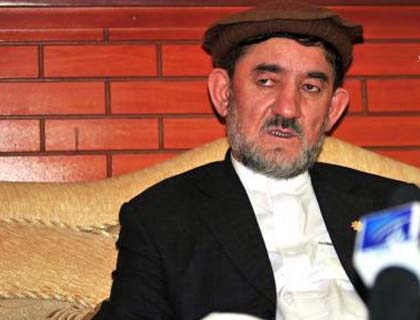"Afghan enemies once again succeeded to bring down another highly influential element", it was the headlines of domestic newspapers with minor differences. On Sunday, December 25, a senior leader to National Coalition Political Party, a member to Jamaat-e- Islami, Mr. Abdul Motalib Beeg, was killed in suicidal attack in a northern province, Takhar. According to reports, he participated to a funeral and after completion of worship, a suicide bomber exploded himself which along with Mr. Motalib left more than 20 dead and more than 50 injured.
He was a member to lower house of Parliament and very influential figure in Afghan political sphere. Losing the second fellow within months, MP's strongly condemned the attack and criticized government on the basis of following peace process without consideration of Taliban militants' reaction.
Mr. Abdul Motallib was not the first influential figure who was killed and perhaps he may not be the last one. Likely, there are many others on the wanted list of Taliban-led militants to be erased. Previously, former President and chief of High Peace Council, Mr. Buhanuddin Rabbani was killed by a suicide bomber, claiming to be the delegate of Taliban, in his very house. Similar attacks took the lives of General Dawood Dawood, Wali Karzia the half-brother of President Karzia and etc.
However it is maintained by many that insurgents have a long wanted-list to be erased, but there is no information about who would be the next.
Targeting top civil and political figures is not a very old strategy of insurgency. It has been held recently. Though there is no data to indicate exactly when Taliban leaders decided to change their policy from fighting Afghan and foreign security forces to broader level——combating and targeting particular individuals simultaneously. But targeted assassinations appeared right after military withdrawal slept on the hotbed of political discussions.
Therefore, many analysts and political experts concluded that leaders maintained that after the completion of withdrawal, there would be Jihadis and other influential figures challenge their power.
After years of exhaustive war with insurgency, the mission increasingly lost popularity across the globe. Many countries just withdrew their involved forces and many other clearly fixed timing for withdrawal. Ruling parties across NATO member countries have been under severe pressure to end the mission and call troops back home. Series of protests held against the presence of respective countries in Afghanistan.
So, ruling parties have been under pressure to end their mission and they had to convince civilians that their sons and daughters are fighting for humanitarian values. The problem doubled amidst financial crisis and economic recession which have challenged almost all militarily involved countries.
No doubt, the process could further complicate the situation for United States of America which bears the largest share in anti-insurgency struggle in the country. Of course, it costs US and its allies a lot to leave the country while the possibility of Taliban return back to power remained. President Obama from the very start emphasized to fight Taliban and al-Qaeda in Afghanistan.
He surged troops, the strategy which started during former President Bush and continued during his incumbency in Iraq and worked out. He decided to send more around 30 thousand extra troops to deal lethal blows to Taliban and its al-Qaeda establishment and weaken them to a level that Afghan security forces could cope with the situation unilaterally.
Seemingly, however the insurgency remains as critical challenge, but Helmand and Kandahar, two main headquarters of Taliban, are presently out of their control. However, it should be noticed that militants have succeeded to open a new front on eastern provinces from where they easily take refuge to neighboring country.
But, ostensibly, NATO military officials are satisfied with the security situation like Kabul government. As part of the program, recently when news about the withdrawal of 10 thousand US troops circulated, both Kabul and foreign officials emphasized that it did not affect the security situation, because Afghan security forces have the capacity to cope with the situation.
However, it has been a long time that Kabul government pushes for the so-called Afghanization and asked foreign allies to train and equip domestic forces. But can Afghan force deal with the situation after the completion of military withdrawal process in 2014; the answer has still remained in the envelope of anonymity.
Anyhow, what is important is that the Taliban leaders are in view that foreign forces would not keep their forces indefinitely in the country and they would withdraw. So, many view that what remains as real challenge to insurgency are influential figures within and out of the government who are able to summon civilians in no time and challenge their resurgence.
Their presence within the government can improve its credibility and civilians will support it. Having the civilians support, it will be difficult and perhaps impossible for Taliban-led militants to once again threaten the existence of government in the future.
This is the issue which weakens the possibility of Taliban's success in the future. Therefore, they are organizing such targeted attacks.
It was about the future. Their assassination has potential to disturb political and security situation alike. Consider, for example, the case of Mr. Burhan ud din Rabbani. After his assassination, protestors chanted anti-government, particularly, anti President Karzia slogans. Moreover, his death encountered the peace negotiation in a complete deadlock; the relation between Kabul and Islamabad got tense, and etc.
Somehow similar perplexities occurred after the assassination of General Dawood Dawood.
In the short term, there would not be potential figure to replace them and play their role in leading people towards intended objectives. Their presence within the government or even as an opposition was beneficial.
Thus, through assassination of influential figure, Taliban can perplex officials and weaken the administration, because these figures had the potential to bridge the gap between government and people.

